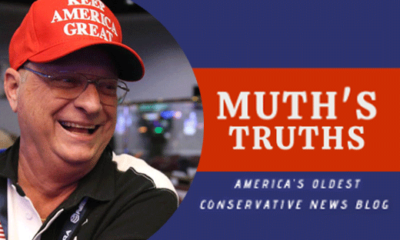The biggest mistake Republican candidates and their high-paid professional political consultants make is thinking they’re running a political campaign.

They’re not.
They’re running a MARKETING campaign.
And most do it very badly.
So let’s jump into #4 of my seven ways for Nevada Republicans to get their mojo back: Messaging.
Now here’s the most important thing: Messaging should be about the voter, not the candidate.
It’s all about PERSUASION. It’s about sales. It’s about how to win friends and influence people.
People don’t want to hear you talk about you. They want to hear you talk about THEM.
ALL people…regardless of race, creed, color, gender, age, religion, national origin or sexual preference.
Voters – and sorry to break this to you, candidates – couldn’t care less about you. They only care about what you can do for them.
In professional marketing we say they’re tuned into WIIFM: What’s In It For Me?
Alas, most candidates run ego-driven campaigns that are all about the candidate. The voters’ interests are an after-thought…if they’re thought about at all. Let me give you an example.
Here are some excerpts from soon-to-be former U.S. Sen. Dean Heller’s 2018 campaign website…
- “What’s most important to Dean?”
- “Dean Heller grew up in…”
- “(Dean) learned…”
- “(Dean) also developed a love for…”
- “Dean married…”
- “Dean has always seen…”
- “(Dean’s) first question is always…”
- “Dean is committed to…”
- “Dean Heller has passed more than…”
- “Dean enjoys…”
- “Dean is known for…”
- “Dean Heller understands…”
- “(Dean) makes it his priority…”
- “Dean’s record”
- “Dean delivers for…”
- “See Dean’s legislation…”
It’s like that old episode of the Brady Bunch. But instead of “Marcia, Marcia, Marcia,” it’s “Dean, Dean, Dean.”
Now, don’t get me wrong. You can and need to tell people about yourself. But you also have to explain to voters what that means to THEM. It’s features vs. benefits. It’s “I have/YOU get.” For example:
“I have 20 years’ experience as a certified public accountant, so you get a legislator who knows exactly what to look for in the state budget to make sure your tax dollars aren’t being wasted.”
And if you don’t do that on your “Bio” page, then you need to do it on a “Why I’m Running” page.
Amazingly, Heller’s website didn’t include a “Why I’m Running” page in which he ‘splained how his attributes, background and experience would benefit the voters.
Epic fail. His general consultant, Mike Slanker, and his entire Keystone Kops communications team should be sued for malpractice.
By the way, the same marketing principle applies to social media, press releases and blog posts. The focus should be on the VOTERS, not the candidate. But rarely is.
Here’s another example: A Twitter post from Heller a couple days before Election Day…
“Don’t let the fake news or attack ads paid for by California donors get you down-it doesn’t get me down. It motivates me because I believe NV is not for sale. We’re going to win this. I’m confident.”
“I” and “me.” I, yi, yi, yi, yi.
Oh, and in case you missed it, Dean didn’t “win this.” He lost…bigly.
And how many Twitter or Facebook posts do you see featuring photos of the candidate rather than the voter?
Indeed, whenever a voter or voters ARE featured in too many campaign communications, they’re used simply as a campaign prop. Scenery. A potted plant. An extra.
Here’s an example of a pair of Heller tweets from October 31, 2018…
“I worked to deliver $33.5M for the construction of the Northern NV State Veterans Home, & today I had the opportunity to tour the site…”
“I attended the groundbreaking ceremony last summer & am amazed by the tremendous progress that has been made on the construction of this state-of-the-art facility.”
“I,” “I,” “I.” Oof.
The tweet included two photos of Dean with a woman construction worker…who was not even mentioned, let alone named! It was all about Dean.
It should have been the other way around. The voter should have been the STAR.
Instead, the tweet should have been something like…
“Thank you, Jane Doe, for showing me the tremendous progress you and your co-workers have made on the construction of this state-of-the-art facility.”
Ya think Jane would have shared THAT tweet with her family, friends, co-workers and neighbors…all of whom are potential voters?
Another marketing point: The campaign theme should be about what you’re going to DO that will benefit the voters, not what you claim you are.
How many inane campaign slogans have you seen like these (actual campaign slogans)?
- “Leadership, Experience, Values”
- “Trust, Honesty, Integrity”
- “Proven Performance, Genuinely Cares”
- “A Leader with Results”
- “Breaking Barriers, Building a Future”
- “The Choice for Better Change”
- “New Voice, New Leadership”
- “A Fresh Face, A Fresh Start”
- “Working for Us”
- “The Right Experience, The Right Choice”
Blech!!!
Doesn’t exactly send a tingle up your leg, does it? Pure political inside-the-beltway DC pablum.
Seriously, how many voters are going to be persuaded to vote for you because they wake up on Election Day and say to themselves: “You know, what’ll really help us pay for the kids’ college tuition is a candidate who is breaking barriers and building a future. I’m voting for Schmedlap!”
Oy.
On the other hand, what was Donald Trump’s – an EXPERT marketer if there ever was one! – campaign theme?
“Make America Great Again”
It was short. It was simple. It was memorable. It was a campaign promise to DO something that voters valued and had a desire to obtain because their lives, and the lives of their children and grandchildren, would be better for it.
It was a message of hope. It held out the promise that things would get better for THEM if they elected HIM.
Trump also promised and demonstrated that he was willing to fight for what his voters wanted. People love a fighter. Especially an underdog fighter.
I mean, who didn’t cheer when Mel Gibson, in the movie Braveheart, after being asked where he was going during that famous confrontation with all the king’s men, replied: “I’m goin’ to pick a fight.”
And what about Rocky Balboa, hmm?
Yet here’s what Heller ran on, taken directly from his campaign website…
“Dean was ranked as the 5th most bipartisan Senator in the United States Senate and has a proven record of crossing party lines…”
And he wonders why his conservative Republican base didn’t turn out and vote for him?
Trump also promised voters they would be winners again. And people would rather be winners than losers. Remember what Gen. George Patton said about this?
“Americans love a winner. Americans will not tolerate a loser. … Americans play to win all of the time. I wouldn’t give a hoot in hell for a man who lost and laughed.”
Trump, the expert marketer, didn’t just tell people what they wanted to hear. He made them feel what they wanted to feel.
He was a master at the art of persuasion.
And he spoke to voters in the plain, ordinary, simple language of the average voter, not the DC elite and the political consulting corps. Here, compare and contrast…
Trump’s website Home page: “Together, we are rebuilding our nation.”
Heller’s website Home page: “Committed to advancing Nevada’s top priorities.”
Sorry, but I’ve never sat around a dinner table and heard someone say, “You know, what we really need is a candidate who’s committed to advancing our top priorities.”
Have you?
I could go on and on and on about this for days on end. But let’s wrap up for now.
I can’t tell the Republican Party or Republican candidates exactly what issue or issues they should focus on. It varies from year to year, race to race, district to district, state to state, and constituency to constituency.
But what I can say is that the WAY in which the message is presented to voters – regardless of the candidate or issue – needs to be delivered differently and better.
That means the party and its candidates need to stop thinking about elections as political campaigns and start thinking of them as marketing campaigns.
Campaigns that tell voters how voters will benefit, not how the party or the candidate will benefit. It’s about persuasion. It’s about influence. It’s about sales.
Candidates need to learn about marketing. They need to read about marketing. They need to listen to podcasts about marketing. They need to study marketing. They need to live, breathe and eat marketing.
Marketing, marketing, marketing.
And lastly, even the most marketing-savvy candidate is likely to go down in flames if he or she hires a campaign manager or consultant who knows all about political science but nothing about sales psychology and persuasion.
As I’ve said for years – paraphrasing the late marketing and copywriting legend, Gary Halbert – there’s more incompetence in the field of political consulting than in any field other than psychiatry.
Indeed, many candidates who should have won ended up losing thanks to their consultant’s ineptitude.
Think, Mike Slanker.
Here’s a tip: If you’re interviewing potential campaign managers and consultants, ask them if they know and have studied Halbert, John Caples, Robert Collier, Claude Hopkins, David Ogilvy and Robert Cialdini (THE authority on the art of persuasion; in fact, he wrote THE book on it).
For extra credit, ask if they’ve read and studied Dan Kennedy, Bill Glazer, Joe Sugarman Jay Abraham, Ron Popeil, Brian Tracy, John Carlton, Ted Nicholas, Eugene Schwartz, Ryan Deiss, Tim Ferris, Frank Kern, Perry Marshall, Seth Godin, Jack Canfield and Jay Conrad Levinson.
If not, show ‘em the door.
By the way, if you’re a business owner, sales professional or entrepreneur and you don’t know the names of the marketing gurus I just listed above, get thee to Amazon.com stat!
Bottom line: Republicans had a LOT of really good candidates on the ballot this year in Nevada. But they lost. Not because they were bad people or wouldn’t have made good elected representatives. But because they ran bad campaigns that didn’t “make the sale.”
And you can’t serve if you can’t get elected.
Up next: The BIGGEST change the Republican Party needs to make in 2019 if it wants to field winning candidates in 2020. Stay tuned, Batfans…






Facebook
Twitter
Pinterest
RSS